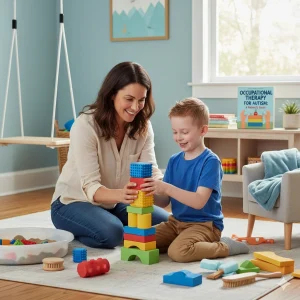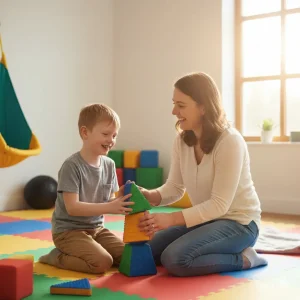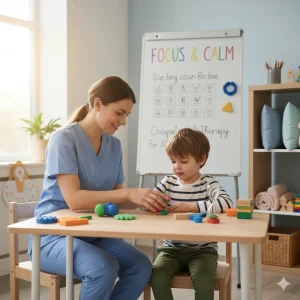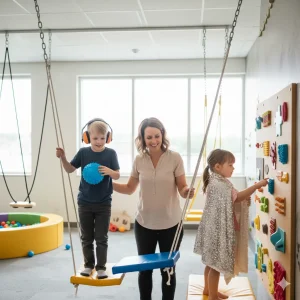Speech Therapy Near Me: How to Find Trusted Help for Kids and Adults
By Wellness Hub
Last Updated: July 26, 2025
Whether it’s a toddler struggling to speak their first words or an adult recovering from a stroke, speech therapy can be life-changing. But finding the right help—especially close to home—can feel overwhelming. You’re likely searching for speech therapy near me or wondering how to choose a certified speech therapist for your child or loved one. You’re not alone.
The good news? Whether you’re looking for pediatric speech therapy near you, adult speech therapy services, or even online sessions from the comfort of home, there are more trusted options than ever before.
In this guide, we’ll break down everything you need to know to confidently find speech therapy for kids and adults—from what to look for in a therapist, to the pros and cons of in-person vs online sessions, and how platforms like Wellness Hub are making expert help accessible across India.
Free Speech Help for Kids
Concerned about speech delays? Book a free consultation with our expert speech therapist and get guidance tailored to your child’s needs.
Understanding the Need for Local Speech Therapy Services
In recent years, there’s been a noticeable rise in the number of people—both children and adults—seeking help for speech and communication difficulties. From toddlers with delayed speech to adults recovering from strokes or struggling with voice issues, the demand for professional speech therapy has grown significantly.
One key reason? Greater awareness. Parents, teachers, and even employers are now more informed about speech and language delays and are actively seeking support. At the same time, stress, neurological conditions, developmental differences, and aging can all impact how we speak, understand, and interact.
But while awareness has increased, access is still a challenge for many families. That’s why more people are searching for ways to find speech therapy near me—because location matters.
Why Location and Accessibility Make a Big Difference
Speech therapy isn’t a one-time session. It often requires ongoing, consistent interaction between the therapist and the client. Especially for children, building rapport with a trusted speech-language pathologist (SLP) takes time and routine. That’s why having someone nearby makes the journey easier—not just logistically, but emotionally too.
When services are within reach, families are more likely to stick with therapy, attend appointments regularly, and feel supported. For adults balancing work, recovery, or caregiving, having the best local speech therapist for adults nearby can mean the difference between postponing therapy and getting timely care.
Parents, especially, benefit when they can easily access speech therapy services for kids near me, reducing travel stress and ensuring their child gets early, consistent intervention.
It’s Not Just About Distance—It’s About Trust
Choosing a local therapist also allows families to get real feedback from others in the community. It becomes easier to check reviews, talk to other parents, and see firsthand how therapists work with clients. Trust is critical in speech therapy—and being close to your provider builds that relationship over time.
In the next sections, we’ll explore who can benefit from speech therapy, how to decide between online and in-person services, and what to look for in a trusted speech professional.
Who Needs Speech Therapy?
Speech therapy is not just for one age group or one kind of difficulty. It’s a powerful support tool that helps people across all stages of life—from young children just beginning to talk, to older adults regaining speech after a medical condition. But one of the most common reasons families seek help is for children struggling to communicate.
Speech Therapy for Children
Every child develops at their own pace. But when a child struggles to speak clearly, use words, or interact socially, it can impact their learning, relationships, and self-esteem. That’s where pediatric speech therapy comes in.
A speech-language pathologist (SLP) who works with children is trained to understand the unique ways kids learn language and speech. Whether your child is dealing with a speech delay, autism spectrum disorder, or articulation issues, a skilled therapist can help them grow confident in their communication.
Many parents search for “pediatric speech therapy near me” when they notice their child isn’t meeting developmental milestones or has trouble expressing themselves. The earlier the support begins, the better the outcomes often are.
Common Signs That May Signal a Need for Speech Therapy:
- Delayed talking: Your child isn’t saying words or forming short sentences by age 2
- Difficulty pronouncing certain sounds (like “r,” “s,” or “th”)
- Limited vocabulary compared to other kids the same age
- Stuttering or hesitation when speaking
- Not responding to their name, or not seeming to understand simple instructions
- Challenges with social interaction — not making eye contact, not playing with others, or using very few words
These signs don’t always mean something serious—but they’re worth checking with a professional. In many cases, pediatric speech therapy helps children catch up quickly and gain the confidence they need.
The Role of Early Intervention
The earlier therapy begins, the easier it is to support your child’s brain as it rapidly develops. Speech therapists work through play, stories, songs, and games—making the experience fun and engaging for kids while targeting specific communication goals.
And by choosing pediatric speech therapy near me, parents can be involved in the process. Regular in-person sessions with a local therapist give you a chance to ask questions, learn techniques, and support your child’s progress at home too.
Speech Therapy for Adults
Speech and communication challenges don’t only affect children. Many adults experience difficulties with speech, language, voice, or even swallowing due to medical conditions, injuries, or stress-related disorders. Fortunately, adult speech therapy offers effective, personalized strategies to help restore communication and improve quality of life.
If you’ve ever searched for “adult speech therapy near me,” you’re likely looking for support that is not just skilled—but also sensitive to adult needs like confidence, independence, and return to daily function.
When Adults Might Need Speech Therapy
There are many reasons an adult might seek out the help of a speech-language pathologist (SLP), including:
- Post-stroke rehabilitation: Stroke survivors often face aphasia (difficulty understanding or producing language) or dysarthria (slurred speech). Therapy helps them re-learn how to speak, understand, read, or write.
- Brain injuries and neurological conditions: Head trauma, dementia, or Parkinson’s disease can impact speech and communication. Therapists work on cognition, memory, and expression alongside verbal skills.
- Stammering or stuttering: Some adults may have stuttered since childhood or developed disfluency due to stress or anxiety. Speech therapy provides techniques to manage and reduce stammering over time.
- Voice disorders: Jobs like teaching, singing, or public speaking can strain the voice. Adults with hoarseness, pitch problems, or vocal fatigue benefit from vocal hygiene training and structured voice therapy.
- Swallowing difficulties (dysphagia): Many speech therapists also help adults regain safe swallowing after surgery, stroke, or illness.
The Role of Adult-Focused Speech Therapy
Adult speech therapy isn’t one-size-fits-all. It’s tailored to your daily life, professional needs, and communication goals. Whether you need to regain clear speech after a stroke, improve fluency, or build back confidence in conversation, a certified therapist works with you step by step.
Sessions may include:
- Guided speech exercises
- Breathing and vocal control techniques
- Conversational practice
- Cognitive-linguistic training
- Home programs to reinforce progress
And with more providers offering flexible sessions, it’s easier than ever to find adult speech therapy near me—either in person or through online platforms.
Confidence and Independence Start with Communication
Speech is more than just words. It’s how we connect, work, share emotions, and stay engaged with the world. For adults facing speech challenges, therapy can bring back that connection and restore a sense of control.
If you or a loved one is navigating communication difficulties, don’t wait. With the right support, improvement is not just possible—it’s expected.
Online vs In-Person Speech Therapy: Which One Is Right for You?
When looking for the best way to support speech and language development, one of the biggest questions families and individuals ask today is: Should I go for online or in-person speech therapy? The good news is—both models can be effective. The best choice depends on your needs, preferences, and accessibility.
Thanks to technology, searching for “speech therapy near me” no longer means just finding a clinic around the corner. It now includes online speech therapy for adults and children, giving people access to certified experts no matter where they live.
In-Person Speech Therapy: The Traditional Approach
Pros:
- Face-to-face interaction can help build trust, especially for young children who may need hands-on play-based sessions.
- Allows for physical support in techniques like oral motor exercises, feeding therapy, and more.
- May offer access to on-site tools and materials tailored to individual needs.
- Easier for therapists to observe body language and subtle cues in real time.
Cons:
- Requires travel, which may be challenging for those in remote areas or with busy schedules.
- Limited availability of specialized therapists in smaller towns or cities.
- May involve long waitlists or fewer options for preferred language or cultural fit.
Online Speech Therapy: Flexible and Accessible
Pros:
- Convenient and flexible—perfect for working parents, students, or adults recovering at home.
- Access to specialized therapists no matter where you live, including bilingual or culturally sensitive professionals.
- Effective for a wide range of issues—from speech delays in toddlers to voice therapy for adults.
- Many platforms offer interactive tools, video exercises, and digital worksheets that engage children and adults alike.
Cons:
- Requires a stable internet connection and a quiet space for sessions.
- Very young children or individuals with severe cognitive impairments may need more hands-on support from a parent or caregiver during online sessions.
- Some techniques (like muscle stimulation or physical guidance) may be limited online.
So, Which One Is Right for You?
If you’re someone who values face-to-face interaction, has access to a local clinic, and needs physical support, in-person therapy might be the better fit.
But if flexibility, convenience, and expert access are your top priorities—online speech therapy for adults and children is an excellent and increasingly popular option. In fact, many families start with in-person therapy and later transition to online sessions for ongoing support.
The Hybrid Advantage
Some providers now offer a hybrid model, combining online consultations with occasional in-person visits. This approach gives you the best of both worlds—accessibility with personal touch.
Ultimately, both formats share the same goal: helping individuals communicate with confidence. What matters most is choosing a certified, experienced therapist who understands your goals—and who makes therapy feel supportive, engaging, and effective.
How to Choose a Trusted Speech Therapist Near You
Finding the right speech therapist isn’t just about convenience—it’s about trust, qualifications, and connection. Whether you’re looking for help for your child or an adult family member, choosing a skilled and compassionate professional can make all the difference in progress and comfort.
As more people search for ways to find certified speech therapist near me, it’s important to know what to look for and how to make an informed decision. Here’s a helpful guide to walk you through the process.
Essential Credentials to Look For
Before booking a session, make sure the therapist you’re considering is properly trained and certified.
Certified Speech-Language Pathologists (SLPs)
Always ensure your therapist is a licensed Speech-Language Pathologist (SLP). Certified SLPs have completed advanced training, clinical practice, and are licensed by a professional board in their country (such as the Rehabilitation Council of India or ASHA in the U.S.).
This certification guarantees they’ve been trained to diagnose and treat a wide range of communication disorders—from speech delays in toddlers to voice issues in adults.
Experience and Specialization Matter
Not all SLPs specialize in the same areas. Some focus on pediatric speech therapy, while others have more experience with adult rehabilitation after stroke or injury.
Look for:
- Years of experience in the area that matches your needs
- Familiarity with specific conditions like autism, stammering, aphasia, or articulation disorders
- Comfort with bilingual or culturally sensitive therapy, if relevant
When you search for a certified speech therapist near me, dig deeper to see if their expertise aligns with your or your child’s specific challenges.
Evaluating Reviews and Testimonials
Online reviews can offer valuable insight—but only if you know what to look for.
Why Patient Stories Matter
First-hand experiences shared by other parents, adults, or caregivers can give you a real sense of how a therapist works—both in their technical skill and their bedside manner.
Look for testimonials that mention:
- Improvements in communication or speech clarity
- Warm, supportive therapist behavior
- Clear progress over time
- Engagement with children or comfort with adult clients
How to Spot Credible Feedback
Not all reviews are created equal. Look for platforms with verified users or clinic websites that include real stories with names or context. Be cautious of vague or overly generic reviews with no specific feedback.
Questions to Ask Before Booking
A good therapist will always welcome your questions. Asking the right ones up front can help you feel more confident and informed before you start therapy.
Here are some important ones to consider:
- What’s your experience with my child’s (or adult’s) specific concern?
- How do you set goals and track progress?
- What does a typical session look like?
- Do you offer home programs or parent/caregiver guidance?
- Are you available for in-person and/or online sessions?
- What languages or communication styles are you comfortable working with?
Taking the time to ask these questions ensures you not only find a certified speech therapist near you, but also the right match for your goals, personality, and preferences.
Wellness Hub: Bringing Trusted Speech Therapy to Every Corner
At Wellness Hub, we believe that quality speech therapy should be accessible to every family—no matter where they live. Whether you’re in a metro city, a small town, or a rural village, communication is essential, and the right support can change lives. That’s why we’ve made it our mission to offer trusted speech therapy services both online and regionally—tailored to the unique needs of children and adults across India.
Expert Therapy, Wherever You Are
Thanks to our growing network of professionals, you no longer have to spend hours searching for help or sitting on long waitlists. With online speech therapy in India, families can now connect with certified therapists for kids and adults from the comfort of home. Whether it’s a 3-year-old with a speech delay or an adult recovering from a stroke, we bring expert care directly to your screen—no travel required.
And for those who prefer face-to-face interaction, our regional therapy centers across multiple cities offer personalized, in-person support backed by the same high standards and therapist training.
Language & Culture Matter—We Get That
India is incredibly diverse—not just in geography but in language, culture, and communication styles. At Wellness Hub, we don’t believe in one-size-fits-all therapy. That’s why our therapists are trained to provide support in native languages like Telugu, Hindi, Tamil, Kannada, and more.
We understand how important it is for children to learn and communicate in the language they hear at home. Culturally sensitive care also helps build trust and comfort, especially for older adults or families navigating therapy for the first time.
Tools That Make Learning Fun and Meaningful
Therapy doesn’t end when the session ends—and parents shouldn’t feel lost in between appointments. That’s why we offer a range of expert-created tools to help families stay engaged at home.
- The BASICS App – A playful, story-based learning app designed by therapists to boost speech, language, and cognitive skills in young children. Ideal for kids with speech delay, autism, or early developmental needs.
- Printable flashcards and worksheets – Tailored to each skill level, these tools make it easy to practice articulation, vocabulary, and social language skills between sessions.
- Parent tips and home activity guides – So you can confidently support your child’s progress every day.
With Wellness Hub, speech therapy from home isn’t just possible—it’s practical, personalized, and proven to work.
Why Families Trust Us
- Team of certified, highly trained therapists
- Online and in-person options based on your needs
- Sessions in multiple Indian languages
- Evidence-based programs designed by experts
- Holistic approach that includes the family, not just the client
Whether you’re looking for online speech therapy India, in-clinic support, or just a reliable guide on where to start, Wellness Hub is here to help—every step of the way.
Online Speech Therapy Support in Major Cities & Worldwide
Looking for trusted speech therapy near you—but prefer the flexibility of online sessions? Wellness Hub provides certified online speech therapy for children and adults across major cities like Bangalore, Chennai, Mumbai, Delhi, and beyond.
Whether you’re in India or abroad, our online therapy platform connects you with highly qualified speech-language pathologists—without the stress of travel or long waitlists.
Where We Serve Online:
- India: Bangalore, Mumbai, Chennai, Delhi, Kolkata, Pune, Ahmedabad, and more
- Global: UAE, USA, UK, Canada, Singapore, Australia, and NRIs worldwide
- In-Person Therapy Only in Hyderabad
No matter where you are, expert help is just a video call away.
Why Families Trust Our Online Therapy:
- Certified therapists trained in pediatric and adult care
- Sessions in multiple Indian languages: Hindi, Telugu, Tamil, Kannada, etc.
- Custom therapy plans with digital worksheets, BASICS App, and family coaching
- Global support across time zones for NRIs and expats
What to Expect From Our City Clinics
When you visit a Wellness Hub clinic in your city, you can expect:
- One-on-one speech therapy sessions tailored to individual needs
- Clean, child-friendly therapy spaces
- Personalized care plans with progress tracking
- Flexible scheduling for working parents and adults
- Optional online speech therapy continuation if needed
Our goal is to make “speech therapy clinics near me” more than a search—it should lead to real results, expert care, and meaningful progress.
Conclusion
Speech problems can improve a lot with early help—and now, support is just a click away. With online speech therapy for adults and children, you don’t need to live near a clinic to get expert care. At Wellness Hub, we offer trusted speech therapists, easy online sessions, and helpful tools like the BASICS App and worksheets. Whether you’re looking for therapy for your child or an adult, we’re here to help—anytime, anywhere.
Frequently Asked Questions:
1. What does a speech therapist do for kids and adults?
A speech therapist helps people improve their ability to speak, understand, and communicate. For kids, this may include treating speech delays, stammering, or difficulties caused by autism. For adults, therapists work on issues related to stroke recovery, voice disorders, brain injury, or stuttering.
2. How do I find speech therapy near me for autism?
You can search online for “speech therapy near me for autism” or visit trusted platforms like Wellness Hub, where certified therapists offer in-person and online services tailored to autistic children and adults. Look for experience in autism-specific communication challenges.
3. Is online speech therapy as effective as in-person?
Yes! Online speech therapy for adults and children has proven to be highly effective—especially for those in remote areas or with busy schedules. As long as there is a good internet connection and support from caregivers (for kids), online therapy can deliver excellent results.
4. What qualifications should a speech therapist have?
Always choose a certified Speech-Language Pathologist (SLP). In India, therapists should be registered with the Rehabilitation Council of India (RCI). Look for additional experience in your specific area—such as pediatric care, adult neuro rehab, or voice therapy.
5. Can adults benefit from speech therapy?
Absolutely. Adults can benefit from therapy after a stroke, brain injury, stammering, voice issues, or even confidence-related speaking difficulties. Therapy helps adults regain independence, improve communication at work or home, and feel more confident in daily life.
6. How much does speech therapy cost in India?
Speech therapy costs in India can vary based on location and therapist experience. Wellness Hub offers flexible plans for both online and in-person speech therapy, with expert-led sessions at affordable rates.
7. How often should someone attend speech therapy sessions?
The frequency depends on the individual’s age, goals, and the severity of the speech issue. Most people start with 1 to 2 sessions per week. A therapist may adjust this based on progress. For children, regular weekly sessions with home practice often lead to steady improvement. Adults may benefit from intensive or flexible scheduling depending on their needs.
8. Can I do speech therapy exercises at home?
Yes, and it’s highly encouraged! Speech therapists often provide home practice tasks like sound repetition, vocabulary games, or breathing exercises. Tools like the BASICS App, flashcards, and worksheets from Wellness Hub make home practice easy and fun for kids. Regular home practice boosts therapy results and helps families stay involved.
9. What age should a child start speech therapy?
There’s no “perfect” age, but earlier is better. Many children begin therapy as early as 18 months to 2 years if there are signs of delayed speech, limited vocabulary, or trouble following instructions. Early intervention helps children catch up quickly and prevents future learning or social difficulties.
10. Does insurance cover speech therapy in India?
In India, some private health insurance plans may cover speech therapy, especially if it is medically prescribed due to a condition like a stroke or developmental disorder. Coverage varies by provider, so it’s best to check with your insurer. Wellness Hub also offers affordable therapy packages for families paying out of pocket.
About Wellness Hub – Empowering Every Child’s Development
Wellness Hub is a trusted digital platform that empowers parents, caregivers, and professionals with science-backed tools for childhood development. From online speech therapy to home therapy resources, we offer a holistic ecosystem for children facing speech delays, autism, ADHD, and other developmental challenges.
Rooted in evidence-based practices and delivered by certified experts, Wellness Hub bridges the gap between accessibility and quality care. Whether you need at-home speech strategies, developmental checklists, or interactive mobile apps like BASICS, we make early intervention affordable and family-friendly.
Start your journey today with expert guidance tailored to your child’s unique communication and learning needs—anytime, anywhere.
Book your Free Consultation Today
Parent/Caregiver Info:
Client’s Details:
* Error Message








